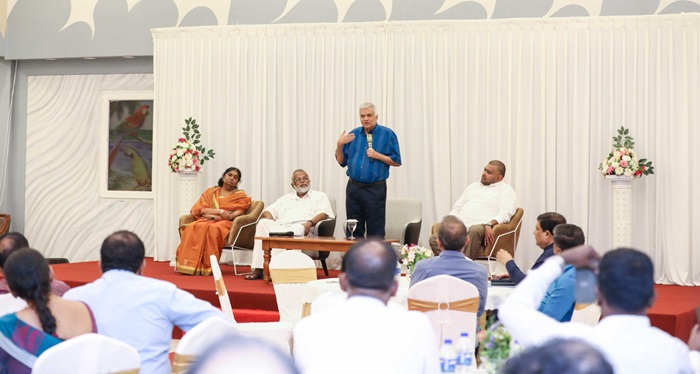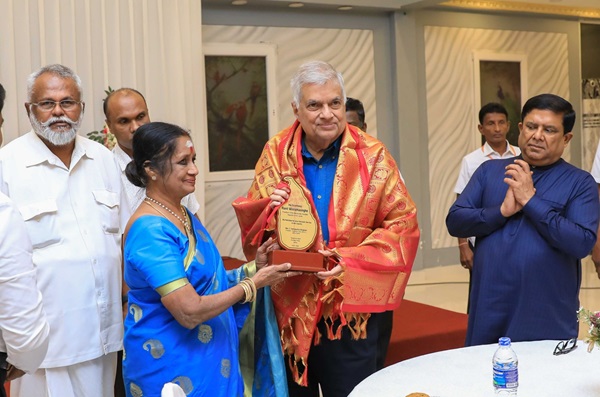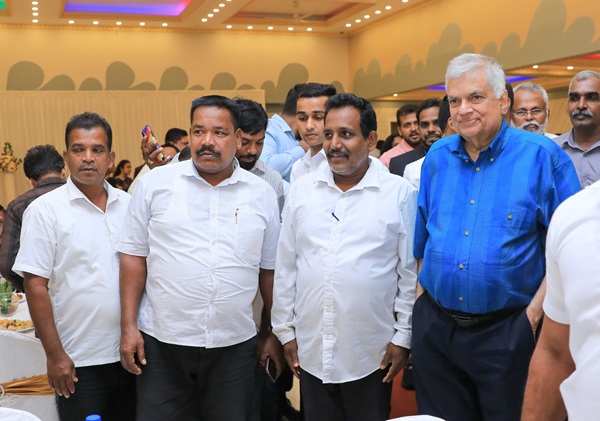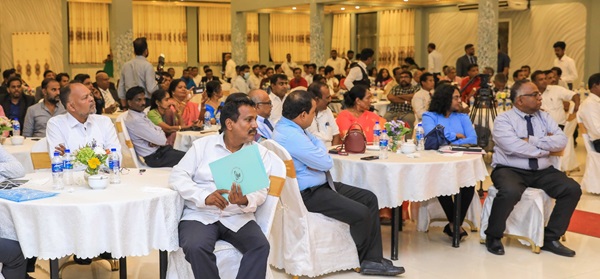
President Ranil Wickremesinghe outlined the trajectory of Sri Lanka’s economic recovery after facing multiple setbacks in recent years, during a dinner gathering with professionals in Jaffna on Thursday (Jan 04).
Addressing the audience, President Wickremesinghe acknowledged the challenges faced by the nation, citing the Easter bomb incident in 2019 and the impact of the COVID-19 pandemic in 2020. He highlighted the grim economic situation in 2022, where the country witnessed a growth decline of over 7%. However, the President emphasized his role in stabilizing the economy in 2023, with positive growth observed in the later quarters.
President Wickremesinghe shared his optimism for the coming years, projecting a positive growth of 2-3% for the current year and a more substantial growth of about 5% in 2025. He underscored the importance of these two years as stabilizing periods and unveiled a strategic shift in economic policies.
The President urged provinces to utilize the powers granted by the 13th Amendment for economic development, asserting that devolution should not merely be a political concept but an economic reality. ―If we examine the provisions of the 13th Amendment, there is ample authority to establish a robust local economy. We pledge not to intervene in those affairs. I am encouraging you to take the initiative. Rather than seeking to monopolize funds from Colombo, consider the examples set by other nations.
Take Japan, for instance; it’s not a federal state, yet various departments and regions are well-developed. The same can be observed in Korea. Look at the United Kingdom-Scotland and Wales have their own developed economies. Why can’t we emulate such functioning regional economies?
France offers a comparable model with economic centres around Paris, Marseille, and other cities. Through devolution, we can harness these powers and foster development. While devolution is often discussed in political terms, it’s essential to enact laws that empower regions. Mere vocal advocacy without financial resources holds little value.
Presently, the Western Province is the sole region capable of substantial independent spending, while others are financially dependent on it. This situation warrants reconsideration. By utilizing the powers within the 13th Amendment, each province can chart its course to development. It’s time to put these powers into action.
A key aspect of the President’s economic plan involves abandoning the practice of printing more money and avoiding excessive borrowing from banks. He highlighted the need to focus on revenue generation, setting a target of 12% of the GDP initially, with a long-term goal of reaching 15%. To achieve this, the President announced plans to increase the Value Added Tax (VAT) in certain instances to ensure a steady flow of revenue for national budgets, development projects, and interest payments.
President Wickremesinghe introduced a paradigm shift in economic development, emphasizing decentralization. He proposed the establishment of local and regional economies in various provinces, moving away from the dominance of the western province and Colombo. The President envisioned distinct economies for the South, Central, North, and North-Western provinces, each capitalizing on its unique potential for agriculture, tourism, and other sectors.
Meanwhile, President Wickremesinghe highlighted three key areas for economic growth – renewable energy, modernizing agriculture, and tourism. He emphasized the vast potential for renewable energy in the Northern Province, particularly in wind and solar power. The President also outlined plans for modernizing agriculture, making it competitive on a global scale. Additionally, he introduced initiatives to boost tourism, including cruise tourism and themed trails focused on religious and cultural sites.
Education emerged as a pivotal element in the President’s vision for economic growth. He envisioned the Northern Province as a hub for education, encouraging the establishment of universities and educational institutions. The President announced plans for substantial investments in technological research, AI, and digital transformation to position Sri Lanka as a digital economy by 2025.
President Wickremesinghe concluded by urging collaboration among civil society, businesses, and members of parliament in the Northern Province to collectively drive economic development. He emphasized the government’s commitment to creating an environment conducive to innovation, investment, and economic prosperity, with the ultimate goal of improving job opportunities and fostering national growth.
Minister Douglas Devananda, MPs Wajira Abeywardena, Angajan Ramanathan, Northern Province Governor Mrs. P.S.M. Charles and Secretary to the President Mr. Saman Ekanayake attended this event.
Meanwhile, young Kilmisha Udayasheelan, the winner of the “Little Champs 2023” reality competition organized by the “Zee Tamil” channel in Tamil Nadu, India, had the opportunity to meet with President Ranil Wickremesinghe alongside her family members. Hailing from Jaffna, the 14-year-old Kilmisha made history as the first Sri Lankan girl to triumph in an Indian reality competition.
Recognizing the acclaim she has brought to the nation, the President extended his congratulations and expressed best wishes for her future education and musical career. As a demonstration of her talent, Kilmisha Udayasheelan also performed a song for the President. (NewsWire)


